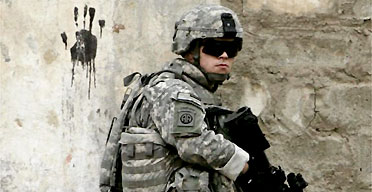

 字體:小 中 大
字體:小 中 大 |
|
|
|
| 2007/03/01 23:35:47瀏覽1079|回應2|推薦3 | |
"combat veterans who are experts in counter-insurgency"不是"資深軍官和反情報專家"而是"身為反顛覆專家的資深軍官" 記者管淑平/編譯 英國衛報1日報導,這批智囊團由資深軍官和反情報專家組成,在巴格達實地了解情況後對駐伊美軍總司令佩崔斯將軍做出建議。他們認為,現在美國有六個月時間打贏伊拉克戰爭,如果贏不了,就將遭受越戰式的潰敗,撤軍,屆時政府將面臨政治和民意支持的瓦解。 US commanders admit: we face a Vietnam-style collapse Elite officers in http://www.guardian.co.uk/Iraq/Story/0,,2023865,00.html An elite team of officers advising the The officers - combat veterans who are experts in counter-insurgency - are charged with implementing the "new way forward" strategy announced by George Bush on January 10. The plan includes a controversial "surge" of 21,500 additional American troops to establish security in the Iraqi capital and Anbar province. But the team, known as the "Baghdad brains trust" and ensconced in the heavily fortified Green Zone, is struggling to overcome a range of entrenched problems in what has become a race against time, according to a former senior administration official familiar with their deliberations. "They know they are operating under a clock. They know they are going to hear a lot more talk in By improving security, the plan's short-term aim is to create time and space for the Iraqi government to bring rival Shia, Sunni and Kurd factions together in a process of national reconciliation, American officials say. If that works within the stipulated timeframe, longer term schemes for rebuilding But the next six months are make-or-break for the · Insufficient troops on the ground · A "disintegrating" international coalition · An anticipated increase in violence in the south as the British leave · Morale problems as casualties rise · A failure of political will in "The scene is very tense," the former official said. "They are working round the clock. Endless cups of tea with the Iraqis. But they're still trying to figure out what's the plan. The president is expecting progress. But they're thinking, what does he mean? The plan is changing every minute, as all plans do." The team is an unusual mix of combat experience and academic achievement. It includes Colonel Peter Mansoor, a former armoured division commander with a PhD in the history of infantry; Colonel HR McMaster, author of a well-known critique of Vietnam and a seasoned counter-insurgency operations chief; Lt-Col David Kilcullen, a seconded Australian officer and expert on Islamism; and Colonel Michael Meese, son of the former US attorney-general Edwin Meese, who was a member of the ill-fated Iraq Study Group. Their biggest headache was insufficient troops on the ground despite the increase ordered by President Bush, the former official said. "We don't have the numbers for the counter-insurgency job even with the surge. The word 'surge' is a misnomer. Strategically, tactically, it's not a surge," an American officer said. According to the "Additional troops are essential if we are to win," said Lt-Col John Nagel, co-author of the manual, in an address at the US Naval Institute in The cut in British troops in southern Increased violence in the south is expected, caused in part by the "displacement" of Shia militias forced out of According to a British source, plans are in hand for the possible southwards deployment of 6,000 Morale is another concern in the Green Zone headquarters: American forces are preparing for a rise in casualties as the crackdown gathers pace. In a message to the troops after he assumed overall command last month, Gen Petraeus praised their sacrifices while warning of more "difficult times" to come. "We serve in "It's amazing how well morale has held up so far," the former official said. "But the guys know what's being said back home. There is no question morale is gradually being sapped by political debates." The advisers are also said to be struggling to prevent the "politicisation" of the surge by the Shia-dominated government. The fear is that any security advances may be exploited to further weaken the position of Despite progress this week on a new law sharing Iraq's oil wealth, the Petraeus team believes the government is failing to work hard enough to meet other national reconciliation "benchmarks" set by Mr Bush.Yet it is accepted that the US is asking the prime minister, Nouri al-Maliki, to do what most politicians in normal circumstances would refuse to contemplate. "What we're doing is asking Maliki to confront his own powerbase," one officer said. Possibly the biggest longer term concern of Gen Petraeus's team is that political will in "The implosion of domestic support for the war will compel the disengagement of US forces. It is now just a matter of time," Mr Simon said in a paper written for the Council on Foreign Relations. "Better to withdraw as a coherent and at least somewhat volitional act than withdraw later in hectic response to public opposition... or to a series of unexpectedly sharp reverses on the ground," he said. "If it gets really tough in the next few months, it will throw fuel on the fire in A senior Pentagon official said this week that it was too early to gauge the strategy's chances of success - but preliminary reports were encouraging. "There are some promising signs. There is a new overall Iraqi commander in US officials say they also have rising hopes of a breakthrough in Sunni-dominated Anbar province where tribal chiefs are increasingly hostile to al-Qaida and foreign fighters - and are looking to build bridges with moderate Shias. But this week's A US soldier in the southeast of Baghdad, Iraq. Photograph: Carlos Barria/Reuters |
|
| ( 時事評論|國際 ) |










